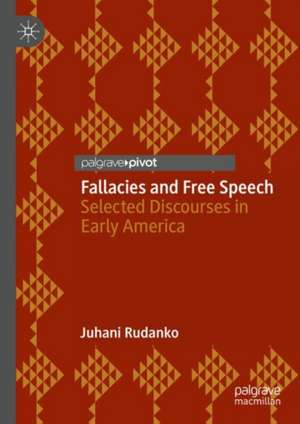Fallacies and Free Speech: Selected Discourses in Early America
Autor Juhani Rudankoen Limba Engleză Hardback – 2 apr 2021
Preț: 435.60 lei
Nou
Puncte Express: 653
Preț estimativ în valută:
83.37€ • 86.90$ • 69.40£
83.37€ • 86.90$ • 69.40£
Carte tipărită la comandă
Livrare economică 06-20 ianuarie 25
Preluare comenzi: 021 569.72.76
Specificații
ISBN-13: 9783030678760
ISBN-10: 3030678768
Pagini: 134
Ilustrații: VII, 134 p.
Dimensiuni: 148 x 210 mm
Greutate: 0.27 kg
Ediția:1st ed. 2021
Editura: Springer International Publishing
Colecția Palgrave Macmillan
Locul publicării:Cham, Switzerland
ISBN-10: 3030678768
Pagini: 134
Ilustrații: VII, 134 p.
Dimensiuni: 148 x 210 mm
Greutate: 0.27 kg
Ediția:1st ed. 2021
Editura: Springer International Publishing
Colecția Palgrave Macmillan
Locul publicării:Cham, Switzerland
Cuprins
Chapter 1: Introduction.- Chapter 2: Probing Deeper than the Surface of Discourse: Identifying Fallacies in a Political Debate in 1789.- Chapter 3: Political Rhetoric in Wartime: a Study from 1812.- Chapter 4: Attacks on the Madison Administration in the Federal Republican in Early 1813.- Chapter 5: James Madison, the Father of Freedom of Speech.- Chapter 6: Conclusion.
Notă biografică
Juhani Rudanko is Professor Emeritus at Tampere University, Finland. He was Associate Professor of English at that university from 1979 to 2001 and then Professor from 2001 to 2016. His publications include books and articles on the system of English predicate complementation, including its evolution, and on early American political history.
Textul de pe ultima copertă
This book offers a new perspective on selected discourses and texts bearing on the evolution of a distinctively American tradition of free speech. The author’s approach privileges fallacy theory, especially the fallacy of ad socordiam, in a key Congressional debate in 1789 and other forms of verbal manipulation in newspaper editorials during the War of 1812. He argues that in order to understand James Madison’s role in the evolution of a broad conception of freedom of speech, it is imperative to examine the nature of the verbal attacks targeted at him. These attacks are documented, analyzed with the concept of aggravated impoliteness, and used to demonstrate that it was Madison’s toleration of criticism, even in wartime, that provided a foundation for a broad conception of freedom of speech. This book will be of interest to both scholars and lay readers with an interest in the application of discourse analysis and historical pragmatics to political debates, argumentation theory and fallacy theory, and the evolution of the concept of freedom of speech in the early years of the United States.
Juhani Rudanko is Professor Emeritus at Tampere University, Finland. He was Associate Professor of English at that university from 1979 to 2001 and then Professor from 2001 to 2016. His publications include books and articles on the system of English predicate complementation, including its evolution, and on early American political history.
Caracteristici
Illustrates methods of pragmatics and discourse analysis that can be used in the analysis of authentic historical texts Presents a new formulation of the neglected fallacy of ad socordiam Argues on the basis of key debate on the Bill of Rights that the fallacy should be reinstated among standard fallacies
